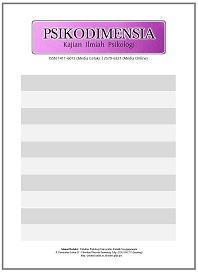Psychological Contract Sebagai Alternatif dalam Meninjau Pemenuhan Harapan Akademik di Perguruan Tinggi
Abstract
Higher education, as an institution that generates the nation's next future leader, is no longer burdened with merely providing knowledge alone. Human resource competitiveness was being one of higher education responsibility to complete, to achieve a great quality of their graduates. Hope that emerged from the students on the fulfillment of obligations towards their university becomes something that can not be separated from the quality of the graduates. Psychological contract as a concept that can explain it, has not been widely studied in a higher education setting especially in Indonesia. The number of measuring instruments has its version on some theoretical models raises curiosity as to what is actually appropriate. Through the method of literature review, it was carried out a critical discussion of the components in the measurement of psychological contract at higher education institutions. The exposure in understanding the dynamics of inter-dimensional and determine the appropriate model based on the characteristics of each academic institution. At least, measurement of psychological contract used in higher education setting should be both of promissory (transactional) and non-promissory (relational) dimension. Surely, it always needs to adjust to the conditions and situations relevantly in each institution. Therefore, it would be possible to bring various indicators in each of dimension.
Keywords
Full Text:
download PDFReferences
Argyris, C. (1960). Understanding Organizational Behavior. Homewood : IL : Dorsey Press.
Benzoni, Wade A. Kimberly, Rousseau, DM., and Li, Min.(2006). Managing Relationships Across Generations Of Academics: Psychological Contracts In Faculty‐Doctoral Student Collaborations. International Journal of Conflict Management, Vol. 17 Iss: 1, pp.4 - 33
Blau, P. (1964). Exhange and Power in Social Life : New York : Wiley.
Bunderson, Stuart J. 2001. How Work Ideologies Shape The Psychological Contracts Of Professional Employees: Doctors' Responses To Perceived Breach. Journal of Organizational Behavior, Volume 22, Issue 7, 717–741.
Conway, N. and Brinner RB. (2005). Understanding Psychological Contracts At Work: A Critical Evaluation Of Theory And Research. Oxford University Press.
Coyle-Shapiro, Jacquelline A-M & Kessler, I. (2000). Consequences of the Psychological Contract for the Employment Relationship : A Large Scale Survey. Journal of Management Studies, 37, 903-930.
Geall, V. 2000. The Expectations And Experiences Of First-Year Students At City University Of Hong-Kong. Quality in Higher Education 6, no. 1: 77–89.
Guest, D. (1998). ‘Is The Psychological Contract Taking Seriously?’. Journal of Organizational Behavior, 19, 649-664.
Holtz, Jane L. (1978). Exploring the psychological contract over the life cycle. Dissertation Abstracts International, Vol 39(4-A), 2399.
Janssens, M., et al. (2003). Multiple types of psychological contracts: A Six-Cluster Solution.Sage Journal : Human Relations, Volume 56 no. 11, 1349-1378
Portwood, James D and Mill, Edwin L. (1976). Evaluating the Psychological Contract: Its Implications for Employee Job Satisfaction and Work Behavior. Academy Management Proceeding, 109-113.
Koskina, Aikaterini. (2013). What Does The Student Psychological Contract Mean? Evidence From A UK Business School. Journal of Higher Education, Routledge, Taylor and Francis Group : Vol. 38, No. 7, 1020–1036.
Kotter, J. (1973). The psychological contract. California Management Review 15, no. 3: 91–99.
Lizzio, A., Wilson, Keithia & Simons, Roland. 2010. University Students' Perceptions of the Learning Environment and Academic Outcomes: Implications for theory and practice. Taylor Francis : Studies in Higher Education :Volume 27 : 27-52
MacNeil, 1. R. (1985). ‘Relational contract: What we do and do not know’, Wisconsin Law Review,483-525.
Millward, Lyne J., and Hopkins, Lee J. (1998). Psychological Contracts, Organizational and Job Commitment. Journal of Applied Psychology. Volume 28, Issue 16, 1530–1556.
Morrison, Elizabeth Wolfe & Robinson, Sandra L. (1997). When Employee Feel Betrayed : A Model How Psychological Contract Violation Develops. The Academy of Management Review. Volume 22 No 1, 226-256.
Nelson, L., Tonks, G. & Weymouth, J. (2006). The Psychological Contract and Job Satisfaction: Experiences of a Group of Casual Workers, Research and Practice in Human Resource Management, 14(2), 18-33.
Robinson, S.L., Rousseau, D.M and Kraatz, Mattew S. (1994). Changing Obligation and The Psychological Contract : A Longitudinal Study. Academy of Management Journal. Volume 37 No 1, 137-152.
Raja, U., Johns, G., & Ntalianis, F. (2004). The impact of personality on psychological contracts. Academy of Management Journal, 47, 350–367.
Robinson, S.L and Morrison, E.W. (1995). Psychological Contract and OCB : The Effect of Unfulfilled Obligation and Civic Virtue. Journal of Organizational Behavior, 16, 289-198.
Rousseau, D.M. (1989). Psychological and implied contracts in organizations. Employee Responsibilities and Rights Journal 2, no. 2: 121–38
Rousseau, D.M. (1990). New hire perceptions of their own and their employer’s obligations. Journal of Organizational Behavior 11, no. 5: 389–400
Rousseau, D.M., and Parks, Judi Mc. Lean. (1993) The Contracts of Individual and Organization. Journal of Organizational Behavior, Volume 15 : 1-43.
Rousseau, D.M & Tijoriwala, Snehal A. (1998) Assessing Psychological Contract : Issues, Altenatives and Measures. Journal of Organizational Behavior. Volume 19, 679-695.
Rousseau, D. (2001). Schema, promise and mutuality. Journal of Occupational and Organisational Psychology 74, no. 4: 511–41.
Ruokolainen, Mervi et al. (2016). Pattern of Psychological Contract and Their Relationship to Employee Well Being and In Role Performance at Work : Longitudinal Evidence from University Employees. The International Journal of Human Resource and Management. ISSN : 0958-5192
Sander, P., K. Stevenson, M. King, and D. Coates. (2000). University Students’ Expectations Of Teaching. Studies in Higher Education 25, no. 3: 309–23.
Schein, E. H. (1978). Career Dynamics: Matching Individuals and Organizational Needs. Addison-Wesley, Reading.
Shore, Lynn Mc Farlane & Barksdale, K. (1998). Examining Degree Of Balance And Level Of Obligation In The Employment Relationship: A Social Exchange Approach. Journal of Organizational Behavior, Volume 19, 731-744.
Spies, Alan R. (2010). Instrument to Measure Psychological Contract Violation in Pharmacy Students. American Journal of Pharmaceutical Education , 74 (6) Article 107.
Tekleab, AG & Taylor, MS. (2000). Easing The Pain : Determinan and Effect of Psychological Contract Violations. Annual Meeting of Academic Management.
Voss, R., T. Gruber, and I. Smigin. (2007). Service quality in higher education. Journal of Business Research. Volume 60, no. 9: 949–59.
Willcoxson, L., J. Cotter, and S. Joy. (2011). Beyond the first-year experience. Studies in Higher Education . Volume 36, no. 3: 331–52.
DOI: https://doi.org/10.24167/psiko.v16i1.947
Print ISSN : 1411-6073 | online ISSN : 2579-6321 View My Stats

This work is licensed under a Creative Commons Attribution 4.0 International License.




















